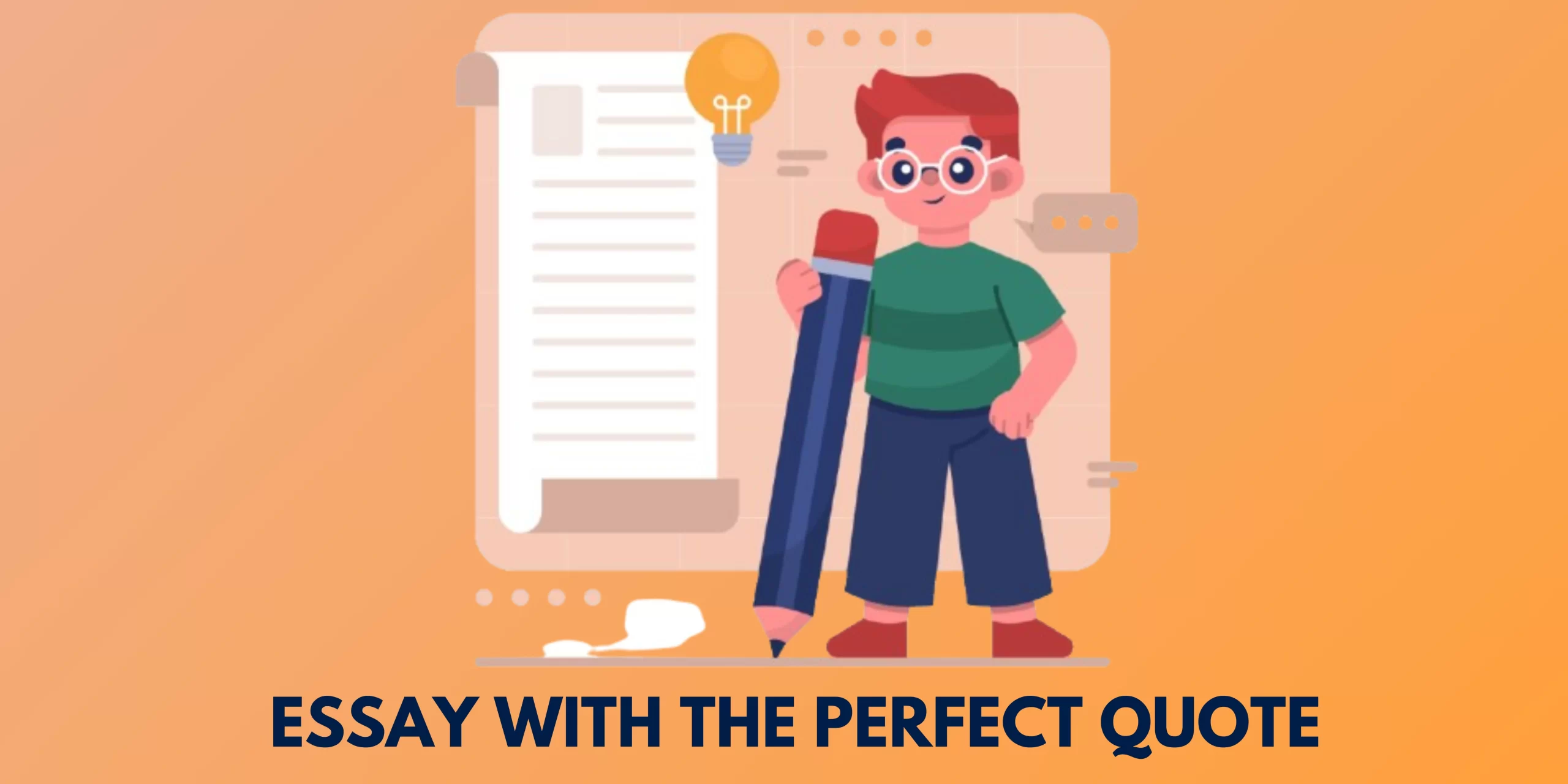Ever stared at a blank page, wondering how to start an essay with a quote that’ll leave a lasting impact? Crafting a powerful opening can be daunting, but there’s a tool often overlooked: quotes. A well-chosen quote doesn’t just set the tone; it grabs your reader’s attention, adds credibility, and gives your introduction a compelling edge. Think of it as lighting a match in a dark room—it immediately draws focus and sparks curiosity.
But why is starting an essay with a quote so effective? It does more than fill space; it connects your thoughts with established voices, bridging your ideas to those of respected thinkers, writers, or experts. Using quotes thoughtfully can transform an ordinary essay into a memorable one that resonates with readers. In this guide, we’ll explore how to master this technique with finesse and nuance, helping you build intros that leave a lasting impression.
Beyond tips on choosing the right quotes, this article offers you practical guidance on when and how to incorporate them effectively. For students managing multiple responsibilities and looking for a bit of extra help, services that can take my online class for me are becoming popular, providing you with support and peace of mind. So, let’s dive in—get ready to elevate your essays and captivate readers from the very first line.
Why Use Quotes in Essays?
Ever wonder why quotes make such a powerful addition to an essay? Imagine you’re writing as a conversation. Adding quotes from authoritative sources is like inviting an expert to back up your argument, giving it weight and credibility. Quotes aren’t just decorative; they’re tools to show readers that your ideas stand on solid ground. In an essay about quotes, the right choice can persuade, clarify, and emphasize your points, making your argument that much stronger.
But quotes do more than add authority. They bring a layer of persuasiveness that can captivate readers from the start, setting the tone and providing insight from a seasoned perspective. Think of a quote as a shortcut to respect—whether it’s a line from a philosopher, an inspiring leader, or an academic helpers, it shows your readers you’ve done the research and adds a bit of star power to your paper.
And let’s face it, juggling assignments can feel like a marathon. For students balancing endless tasks, quotes can help get to the point faster, saving time without sacrificing depth. For those who feel overwhelmed, even services that “pay someone to do my online class” can help lighten the load, leaving time to focus on mastering the art of using quotes for essay impact.
Types of Quotes to Use
When it comes to quotes, not all are created equal. Using the right type of quote can transform a sentence from “just another statement” to an unforgettable highlight. But what types of quotes are there, and how do you know which to use?
Direct Quotes
Direct quotes are your go-to for capturing another author’s exact words. They’re perfect for impactful moments when the original wording holds weight and authority. Use them when you want to retain the speaker’s voice and ideas. Think of it as bringing a guest speaker into your different parts of essay—when you let them speak directly, it packs a punch.
Example: Imagine you’re writing about ambition. You might use Steve Jobs’ words directly: “Your work is going to fill a large part of your life, and the only way to be truly satisfied is to do what you believe is great work.” This introduction of quotation grabs the reader’s attention with authority.
Paraphrased Quotes
Sometimes, you might want the idea but not the exact words. That’s where paraphrased quotes come in handy. You take the original idea, put it in your own words, and blend it seamlessly into your essay. Paraphrasing shows you understand the source material and can explain it in your voice. For example, in academic writing, paraphrasing is often preferred for keeping the tone consistent.
Example: Say you’re discussing scientific curiosity. Instead of quoting Albert Einstein directly, you could paraphrase: Einstein believed that curiosity fuels learning, leading people to explore and understand the world around them. This captures the spirit without the exact words, fitting smoothly within your style.
Common Academic and Famous Quotes
From Einstein to Shakespeare, famous quotes bring a universal appeal. These quotes are powerful because readers are likely familiar with them, making your argument resonate. Introducing a famous line as a way of grounding your essay’s theme is an effective strategy. Examples of introducing a quote this way add an extra layer of meaning.
Example: In an essay about human resilience, you could start with Maya Angelou’s famous line: “You may not control all the events that happen to you, but you can decide not to be reduced by them.” Such a quote provides a strong thematic foundation, instantly engaging the reader.
Feeling a bit overwhelmed? With a busy schedule, it’s understandable to think, “I need someone to take my online class.” Managing multiple demands can be challenging, but mastering the art of quoting effectively will make any essay stand out.
How to Introduce Quotes in Essays?
Wondering how to introduce quotes into an essay smoothly and effectively? Introducing quotes isn’t just about dropping them in; it’s about creating a seamless bridge that connects the quote to your point, adding clarity and depth. A well-introduced quote strengthens your argument, while a poorly introduced one can make your writing seem disjointed. So, how do you do it right?
Provide Context
Think of a quote as a guest at a dinner party—it needs a proper introduction to feel welcomed. Before diving into the quote, offer a brief setup. Describe the quote’s relevance to your topic and, if necessary, provide background on the author. This helps the reader understand why it matters and makes the quote feel like an essential part of your point.
Example: If you’re discussing perseverance, you might write, “As Helen Keller once explained in her writings on overcoming adversity…” This small setup primes the reader, making it clear why the quote belongs.
Use the Right Punctuation
Punctuation matters! It’s what tells the reader how to interpret the quote. Generally, use a comma after introductory phrases like “according to” or “stated,” but use a colon if the introduction is a complete sentence.
Example: “As Keller noted,” (comma) or “Keller’s thoughts on resilience resonate deeply: (colon) ‘The best way out is always through.’” Proper punctuation helps the quote flow, showing readers how to put quotes in an essay without breaking the rhythm.
Analyze and Connect the Quote
Don’t let quotes stand alone. After you introduce a quote, explain why it matters. How does it support your argument? Tie it directly back to your point to keep your writing clear and cohesive.
If you’re overwhelmed with essay tasks and juggling responsibilities, remember that options to pay someone to take my online class can free up time ad upgrade your grades for you to perfect these details. Mastering how to introduce quotes into an essay takes practice, but it’s an invaluable skill for writing that flows.
Starting an Essay with a Quote – Examples and Tips
Beginning an essay with a quote can transform an ordinary opening into something memorable. A well-chosen quote acts like a hook, grabbing your reader’s attention and setting the tone for what’s to come. But why does starting with a quote work so well? It instantly provides a point of connection, aligning your ideas with respected voices and sparking curiosity. Let’s look at some interesting ways to start an essay with quotes that resonate.
Choose a Quote That Reflects Your Theme
Pick a quote that directly ties to your essay’s main theme. For example, in an essay on perseverance, beginning with Winston Churchill’s famous line, “Success is not final, failure is not fatal: It is the courage to continue that counts,” creates a powerful and inspiring entry point. This kind of quote not only sets the tone but also hints at the essay’s central message.
Use Quotes to Ask Questions
Start with a quote, then pose a question to encourage readers to think. For instance, if you’re writing about identity, you could begin with, “Oscar Wilde once said, ‘Be yourself; everyone else is already taken.’ But what does it mean to truly be yourself?” This approach invites the reader into a reflective mindset, ready for the ideas you’ll explore.
Spark Emotion or Curiosity
Choosing a quote that evokes emotion or curiosity is a surefire way to engage readers. In an essay about social justice, beginning with Maya Angelou’s powerful words, “If you’re always trying to be normal, you will never know how amazing you can be,” sets a motivating and thoughtful tone.
Starting with quotes can make an essay stand out, and while it requires careful selection, the effect is worth the effort. Beginning an essay with a quote allows you to start strong, drawing readers in with a thought-provoking statement that resonates with your message.
Using Quotes in Different Essay Sections
Quotes can be powerful tools throughout your essay—not just in the introduction. When used strategically, quotes bring clarity and depth to each section, helping to build a more compelling argument. Let’s explore ways to start essays with quotes and how to weave them effectively into the body and conclusion for maximum impact.
In the Introduction
Starting with a quote in the introduction can set the stage beautifully. How to start a paper with a quote? Pick a line that resonates with your topic’s core message or mood. For instance, if you’re writing about resilience, opening with a line like “Fall seven times, stand up eight” (a Japanese proverb) immediately communicates the essay’s theme of persistence. This technique captivates readers right from the beginning, inviting them to dive deeper.
In the Body Paragraphs
In the body, quotes are your evidence. Use them to support your claims, illustrate key points, or provide expert perspectives. However, avoid overwhelming your paragraphs with too many quotes. Choose one powerful statement per idea and introduce it with context to maintain a smooth flow. Think of quotes in the body as the supporting cast—they’re there to back up the main arguments, not overshadow them. For instance, a well-chosen expert quote can elevate your analysis by adding weight and credibility.
In the Conclusion
Ending with a quote can leave a lasting impression, providing a sense of closure or prompting reflection. When you’re wrapping up, a thoughtful quote can reinforce your argument or offer a final insight. For instance, a social justice essay might conclude with Martin Luther King Jr.’s words, “Injustice anywhere is a threat to justice everywhere.” This leaves readers with a powerful takeaway and drives home the essay’s purpose.
Balancing quotes throughout your essay requires practice, but it can make your writing resonate. And if juggling essay sections feels overwhelming, it’s perfectly fine to seek assistance or wonder if someone could take my exam for me. With the right approach, well-placed quotes enhance clarity and create a lasting impact.
Common Pitfalls to Avoid
When using quotes in your essay, a few common pitfalls can trip you up if you’re not careful. It’s all about balance, precision, and presentation. Avoiding these errors will help you in writing a structured essay that flows naturally and meets academic standards.
Overusing Quotes
It’s easy to get carried away with quotes, especially if they beautifully capture an idea. But remember, your voice is what makes the essay original and impactful. Think of quotes as spices: a little can enhance the flavor, but too much overwhelms the dish. Stick to key moments when a quote will genuinely strengthen your argument.
Neglecting Proper Formatting
Academic writing demands precision, especially with quotes. Failing to follow strict formatting for academic writing can make an otherwise strong essay appear sloppy. Double-check the citation style you’re using—whether it’s APA, MLA, or Chicago—and be sure you’re consistent. Proper punctuation, spacing, and indentation matter.
Lack of Context and Analysis
A quote without context is like a car without wheels—it’s going nowhere. Introduce each quote by explaining its relevance, and always follow up with your analysis. This shows you’re not just dropping in quotes to fill space but actively engaging with the material.
By steering clear of these common mistakes, you’ll ensure your essay is polished, persuasive, and professional.
Ending an Essay with a Quote
Can you end an essay with a quote? Absolutely. Ending with a well-chosen quote can give your essay a memorable final touch, leaving readers with a lasting impression. But it’s not just about picking any quote; it’s about choosing one that resonates with your main points and reinforces your argument.
Choose a Quote That Reflects Your Message
A closing quote should feel like a “mic drop.” It should be powerful, relevant, and aligned with the essay’s core themes. For example, in an essay about resilience, ending with Maya Angelou’s words, “You may not control all the events that happen to you, but you can decide not to be reduced by them,” can underscore your message, leaving readers with a sense of empowerment.
Tie the Quote Back to Your Argument
Don’t just drop the quote in; connect it to what you’ve been discussing. A quick line that links the quote back to your main idea shows your essay is cohesive and purposeful. Think of it as a way to circle back and remind readers of your key insights.
Consider the Tone and Audience
Make sure the tone of the quote matches the tone of your essay. Ending a serious essay with a humorous quote, for instance, can feel jarring. Choose something that feels natural and relevant to both the topic and your readers.
In exploring ways to open an essay or ways to close it, remember that quotes are powerful tools. When done right, they add depth, reinforce your argument, and ensure your essay ends on a strong note.
Selecting Quotes That Add Value
Choosing the right quote for your essay isn’t just about finding something catchy; it’s about picking lines that truly enhance your argument. In an essay about a quote or college essays that incorporate quotes, relevance and credibility should always come first. A well-chosen quote isn’t just filler—it brings new insight, supports your message, and lends authority to your points.
Prioritize Relevance
Ask yourself: does this quote align with my argument? Think of quotes as tools to strengthen your message, not distract from it. For example, if you’re writing about perseverance, a quote about resilience is far more impactful than one about success. It’s like finding the right puzzle piece that clicks into place, making the bigger picture clear.
Check for Credibility
Using quotes from reputable sources elevates your essay’s credibility. Quotes from established authors, scientists, or historical figures carry weight, helping readers trust your perspective. The source matters—after all, anyone can say something inspirational, but a quote from someone respected in the field adds genuine authority.
Mastering the selection of quotes is key, especially when juggling academic demands. And if balancing essays and exams becomes overwhelming, remember, “take my exam for me” services exist to ease that pressure. With the right quotes, your essay will resonate more deeply, leaving a memorable impact on readers.
Related Resources and Services
Academic writing doesn’t have to be a solo journey. With a variety of essay writing services and resources available online, students have more support than ever to meet their writing goals and elevate their work. Whether it’s about tackling complex topics, improving structure, or just getting a fresh perspective, these services are designed to assist every step of the way.
Imagine having essay writing helpers available to provide personalized guidance on anything from crafting introductions to fine-tuning your thesis. For students juggling multiple responsibilities, services like these can make all the difference. With options to get tailored feedback, develop clear arguments, and even access sample essays, you gain the tools you need to excel.
If you’re looking for the best essay writing service USA has to offer, consider one that matches your needs—whether it’s detailed feedback, quick turnarounds, or support across diverse subjects. Remember, seeking help isn’t about shortcuts; it’s about enhancing your skills and achieving your academic best.
Conclusion
Using quotes effectively in your essays can elevate your writing, adding depth and credibility. From how to introduce a quote in an essay to choosing the right quote for each section, mastering these techniques allows you to create a seamless, engaging narrative. Quotes aren’t just decorative; they’re powerful tools that, when used thoughtfully, support your arguments, connect your ideas, and make your points resonate.
In academic writing, it’s essential to balance your voice with those of established thinkers. Select quotes that are relevant and credible, introduce them with proper context, and connect each quote back to your argument. Remember, the goal is to make your essay persuasive and coherent, not overloaded with someone else’s words. By avoiding common pitfalls like overuse and formatting errors, you ensure that quotes add genuine value to your work.
With these strategies in mind, you’re equipped to make every quote work for you, turning each essay into a polished, impactful piece that leaves a lasting impression.










